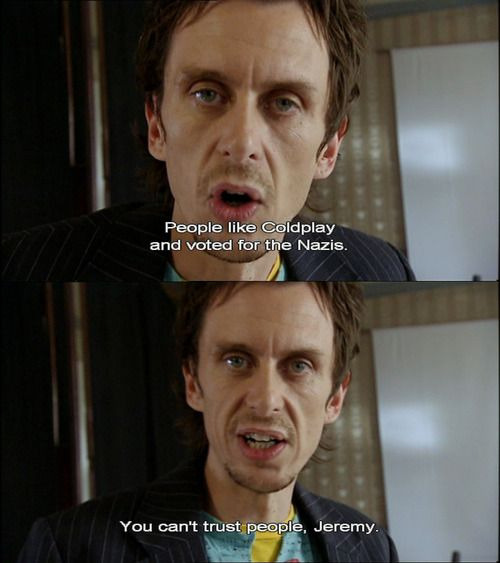 |
| Not included: context, accuracy |
The GIF has popped up again in the last few days, as a pithy C4 response to the dreary show Mrs Brown's Boys being voted the best sitcom of the 21st Century (so far). And so people are retweeting and sharing and liking and LOLing at this quote without bearing in mind two important facts.
1) The character delivering the line is consistently portrayed as a pompous moron throughout the series (in the very first episode, he tells a barmaid not to doodle a shamrock in the head of his pint of Guinness, as he considers it corporate branding - you probably won't see that quoted in future editions of No Logo).
2) Continuing from the first point, really, the statement is wrong in one very important detail. "People" didn't vote for the Nazis.
The Nazis never polled higher than 43.9% of the vote in the days of the Weimar Republic, and even that was only after Hitler had been appointed Chancellor (after having lost a Presidential election to Hindenburg) and the Nazis had already effectively seized power following the Reichstag Fire in early 1933. Seriously, the Nazis never secured an electoral majority. Go and google it if you don't believe me.
Why is this important? In the context of an argument about British comedy, it probably isn't. Screw Mrs Brown's Boys. But the fact is that the NASDAP's rise to power through Weimar's system of Proportional Representation is a comparatively recent phenomenon and must be properly remembered and understood, particularly at a time when many in the UK are talking seriously about electoral reform along the lines of a PR system. There are serious lessons from history to be learned here, and it's no coincidence that Nazi-lite party UKIP are among the biggest voices in the UK in favour of PR. The lessons that Weimar taught us aren't going to be heeded if we allow idiots to perpetuate the crass assumption that one morning in the early 1930s everyone in Germany suddenly woke up evil.
For the record, I'm not necessarily opposed to PR. I do think the UK needs a measure of electoral reform, and PR has by and large worked across large swathes of Europe since 1945. I do however think people should read a bit more recent history before they decide which political model to pursue.
The extent that this crass assumption is already poisoning our system was revealed only too clearly in April 2016 when political dinosaur Ken Livingstone made a career-ending headline grab and said the following:
"Let’s remember when Hitler won his election in 1932, his policy then was that Jews should be moved to Israel. He was supporting Zionism – this before he went mad and ended up killing six million Jews."(Source: http://www.independent.co.uk/news/uk/politics/labour-anti-semitism-row-full-transcript-of-ken-livingstones-interviews-a7005311.html)
Red Ken, who to be fair is probably not a Peep Show fan, has since backtracked and contradicted and obfuscated over this really rather transparent statement, and has since acknowledged that Hitler did not in fact win the 1932 election, and that Hitler was not a Zionist (or "supporting Zionism"). But "people" don't read the frantic equivocations in subsequent interviews, they read the wildly inaccurate headlines. And when major political figures are getting such basic facts so horribly, and dangerously, wrong, we have a problem.
So, yes, every time I see that Super Hans quote used to suggest anything more than the fact that the character is a delusional, pompous, drug-fried music snob, I will very probably correct whoever posted it. Sometimes pedantry is important.